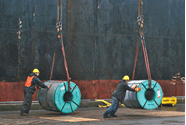Government/Policy

October 21, 2022
ITC Revokes Duties on Brazil HRC, Upholds Them on 7 Others
Written by Michael Cowden
The US International Trade Commission (ITC) narrowly voted to revoke anti-dumping and countervailing duties on Brazilian hot-rolled coil.
The move comes after US trade officials decided to let duties on Brazilian cold-rolled coil expire – a change that has raised the ire of some domestic mills.

The revocation is notable because it could allow for Brazil to once again become an important supplier of hot-rolled coil to the US market, especially since the country does not face a Section 232 tariff of 25%.
That said, Brazil’s participation in the domestic market would be limited by its Section 232 quota.
The revocation of duties on Brazilian hot rolled came following what’s known as a “sunset review” in trade policy jargon.
Duties were originally put in place in August 2016 against imports from seven nations: Australia, Brazil, Japan, the Netherlands, South Korea, Turkey, and the United Kingdom. Russia was also included in the review.
Duties must be reviewed every five years, and US trade policy officials must decide whether to keep the duties in place or whether to allow them to sunset. The sunset review that resulted in the revocation of duties on Brazilian HRC started on Sept. 1, 2021.
It was a split decision when it came to Brazil, with three commissioners voting in favor of removing the duties and two voting against doing so.
All ITC five commissioners voted to uphold existing anti-dumping and countervailing duty orders on South Korean hot-rolled coil as well as anti-dumping duties on material from Australia, Japan, the Netherlands, Turkey, the UK, and Russia.
Brazilian steelmaker Usiminas had faced duties of 34.28% as a result of 2016 trade petition. Companhia Siderúrgica Nacional (CSN) and all other Brazilian steelmakers had been hit with antidumping duties of 33.14%,
Brazil has shipped little or no hot-rolled coil since the duties were put in place in 2016. But Brazil had previously been a major supplier of hot band to the domestic market, shipping 422,646.6 metric tonnes to the US in 2015, the year before the duties went into place, according to Commerce Department figures.







